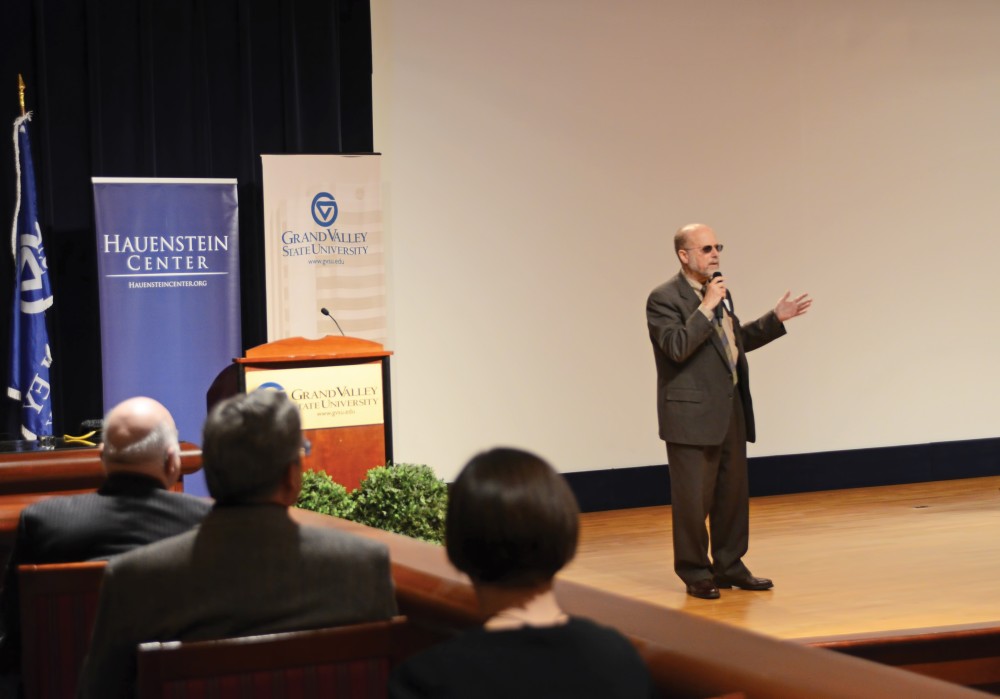‘America’s blind spot’

GVL/Kevin Sielaff Keynote speaker Dr. Jonathan Shay speaks at a community lecture entitled “The Hidden Wounds of War,” in which he tackles issues of combat psychology. Devos 122E, Loosemore Auditorium.
Mar 30, 2014
There are 660,773 veterans living in Michigan according to the U.S. Department of Veterans Affairs. Though they are back home, many are still affected by war as they are forced to deal with their physical, psychological and moral injuries.
In response to these injuries, Grand Valley State University’s Hauenstein Center for Presidential Studies hosted “The Hidden Wounds of War: A Community Response.” Jonathan Shay, a nationally known psychiatrist and the author of “Achilles in Vietnam,” was the keynote speaker at the two-day conference over the weekend.
Presented with help from the Michigan Combat PTSD Task Force, the conference promoted an understanding of post-traumatic stress injury/disorder, traumatic brain injury and moral injury.
The Hauenstein Center held its first conference on post traumatic stress disorder on June 17, 2008.
“This conference I look at sort of as a sequel to that conference, but in many ways, it’s a prequel to that conference because it grapples with the underlying moral injury of war,” said Gleaves Whitney, director of the Hauenstein Center. “The kind of injury that casts a long shadow over the lives of our veterans, their families, their workplace and over the broader culture.”
Whitney is the son of a veteran who fought in the Pacific theatre during WWII. After returning from the war, his father drank, had reoccurring nightmares and watched a lot of westerns.
“He and his generation came back from the war and did much to build our country during the day, but then came the night,” Whitney said. “Sometimes it seemed at night that these men could not escape the war. Dad never talked much about his personal Iliad, but in our house, we knew he suffered from something he experienced in 1943 and 1944. We just didn’t know what to call it.”
Other veterans with PTSD have flashbacks, shutdown outside interests, withdraw from relationships or stop sleeping.
Whitney said his father only alluded once to the friends he had lost during the war. In the New Guinea jungle, his father lived in a tent next to 10 men on a neighboring B24 gun crew.
“That neighboring crew had adopted a parrot,” Whitney said. “They trained that parrot to call out the names of each of the 10 crew members, so Bobby, Jimmy, Tommy, Johnny. One day the crew was shot down, did not make it back, and then came the night. That night the parrot called each man’s name. The captain in dad’s tent took out his pistol, went over to the empty tent and shot the parrot.”
Shay refers to PTSD as America’s collective blind spot, saying that many people do not know the extent of the injury or the community resources that are available to help returning veterans.
Since 2001, more than 2.2 million men and women have served in the Afghanistan and Iraq conflicts. Some return to the U.S. with more than physical and psychological injuries. Shay calls these spiritual or moral injuries, which cannot be treated by a neurologist or a psychotherapist, but rather need the attention of the clergy.
“Most of the public, most of the press, most of the congress, use the umbrella term PTSD for everything bad that happens as a result of going to war,” Shay said. “Now, if that did not create mischief, I would not have any great problem with it, but it does create mischief.”
The word “disorder” is stigmatizing in the world of military forces, Shay said. He added that it’s honorable to be injured in the service to one’s country, but to fall ill is considered by some to be unlucky.
“Nobody wants to share a fighting hole with an unlucky soldier or marine or share an aircraft with an unlucky airman or share watch with an unlucky sailer,” Shay said. “It’s stigmatizing.”
He and several colleagues have asked the American Psychiatric Association to change the name because some people may be more open to asking for help if the word was changed to from “disorder” to “injury,” or something similar.
Shay encouraged clinicians in attendance to have discussions with veteran patients about the resources available to them. He said he hopes that in addition to talking with veterans, they will also help raise the community’s awareness about PTSD to help reduce the stigmas attached to the term.























